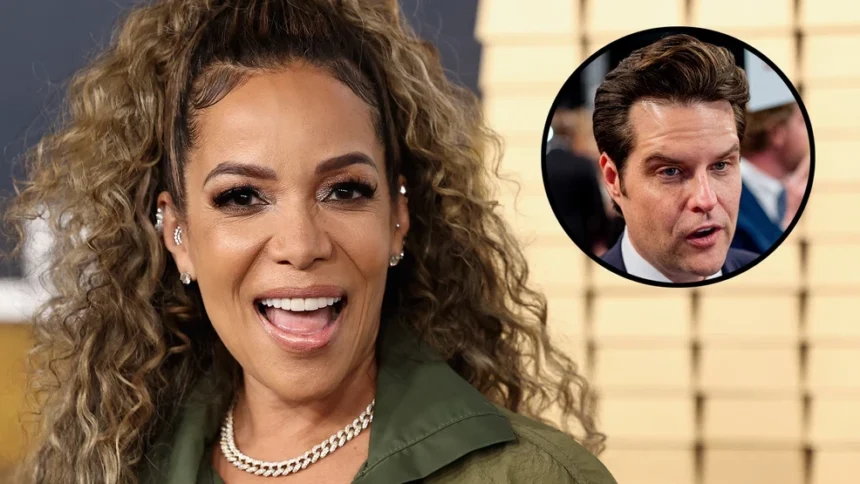Sunny Hostin, a prominent co-host on The View, found herself in hot water recently after making controversial statements about U.S. Congressman Matt Gaetz. Her comments, which inaccurately implied involvement in allegations of child trafficking, led to a rare on-air clarification. This moment highlights the fine line public figures and media personalities must tread between free speech and defamation. Let’s delve into what went wrong, the implications of the legal memo, and the potential lawsuit ramifications.
What Happened?
During an episode of The View, Sunny Hostin referenced allegations against Matt Gaetz, suggesting he was implicated in child trafficking across state lines. She portrayed these claims as credible and ongoing, omitting critical context that the Department of Justice (DOJ) had investigated Gaetz for three years but closed the case without filing charges.
Gaetz has consistently denied the allegations, labeling them as “invented” and “politically motivated.” Following Hostin’s remarks, ABC, the network behind The View, compelled her to read a legal memo clarifying the facts. This memo acknowledged that the DOJ’s investigation into Gaetz concluded with no charges or evidence supporting the accusations.
What Is a Legal Memo?
A legal memo is a statement issued to clarify, correct, or protect a party’s legal standing when misleading or defamatory claims are made. In this case, ABC’s legal team likely prepared the memo to mitigate potential defamation liability from Hostin’s remarks. Defamation occurs when false statements are made about an individual, harming their reputation, and broadcast to a wide audience.
The memo read by Hostin was direct:
“Matt Gaetz has long denied all allegations, calling the claims ‘invented.’ Following a three-year criminal investigation, the DOJ closed the case with no charges being brought.”
By issuing this clarification, ABC sought to prevent any escalation to a formal lawsuit while addressing the inaccuracies on air.
What Went Wrong?
- Lack of Fact-Checking:
Hostin’s comments lacked due diligence. She presented unverified claims as facts, ignoring the DOJ’s closure of the case. Public figures, especially those with large platforms, are responsible for ensuring their statements are accurate. - Failure to Provide Context:
The DOJ’s investigation concluded without evidence to support the allegations. By omitting this crucial detail, Hostin misled the audience, creating a false narrative that could damage Gaetz’s reputation. - Defamation Risks:
Defamation laws protect individuals from false statements that harm their reputation. Hostin’s remarks arguably crossed into defamatory territory, as they suggested criminal behavior without evidence. This opened the door for Gaetz to pursue legal action. - Network Responsibility:
ABC’s decision to issue a legal memo highlights the network’s acknowledgment of potential liability. By forcing an on-air clarification, they aimed to shield themselves from any defamation lawsuit while ensuring journalistic integrity.
Could Gaetz Sue for Defamation?
To succeed in a defamation lawsuit, Matt Gaetz would need to prove:
- False Statement: Hostin’s comments were factually incorrect.
- Publication: The statements were broadcast to millions of viewers.
- Harm: The comments damaged Gaetz’s reputation.
- Negligence or Malice: Given Gaetz’s status as a public figure, he must prove Hostin acted with “actual malice,” meaning she knowingly made false statements or recklessly disregarded the truth.
Given the high-profile nature of the case and the public retraction, Gaetz might argue that the damage to his reputation was significant. However, the swift correction by ABC and Hostin may weaken his case, as courts often consider timely retractions as mitigating factors.
Why Is This Incident Important?
- Media Accountability:
This incident underscores the importance of media accountability. Misleading statements on national television can have far-reaching consequences, affecting careers, reputations, and public trust. - Defamation in the Digital Age:
In an era where content is rapidly shared across social media, inaccuracies can spread like wildfire. This amplifies the potential harm caused by false statements and increases the stakes for public figures and media outlets. - The Power of Legal Action:
The mere threat of a defamation lawsuit compelled ABC to act swiftly. This demonstrates the power of legal recourse in holding media accountable for their statements.
The Broader Context of The View
This isn’t the first time The View has faced criticism for controversial statements. The show has a history of on-air blunders, leading to public backlash and, in some cases, legal threats. From Whoopi Goldberg’s comments about a Staten Island bakery to divisive political debates, the show often finds itself in the crosshairs of controversy.
The recurring theme? A failure to fact-check and provide balanced perspectives. While the show thrives on heated discussions, this incident serves as a reminder that sensationalism cannot replace journalistic integrity.
Final Thoughts
Sunny Hostin’s awkward legal memo reading on The View was more than just an embarrassing moment—it was a lesson in accountability. This incident highlights the importance of verifying facts before making public statements, particularly in a polarized media landscape where reputations are at stake.
For Matt Gaetz, the clarification was a small victory, reinforcing his consistent denial of the allegations. For ABC, it was a necessary step to avoid costly litigation. And for the public? A reminder to approach media narratives with a critical eye.
Defamation cases are not just about the individuals involved; they set precedents for how public discourse unfolds. In this case, it’s clear: words matter, and the truth must always come first.
Sunny Hostin was compelled to read a legal memo after making comments about Matt Gaetz related to a closed DOJ investigation. The memo clarified that the allegations were unproven, and the investigation concluded without charges, highlighting the need for accurate reporting to avoid defamation risks.
Hostin’s comments could have been perceived as defamatory, particularly if they implied unverified or false allegations. This created the potential for a lawsuit against the network, prompting an on-air clarification to mitigate legal risks and uphold journalistic integrity.
Defamation law protects individuals from false and damaging statements made publicly. Media outlets, including The View, must ensure their comments are factual and avoid making unverified claims to prevent legal consequences, such as lawsuits for slander or libel.







